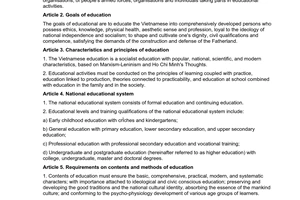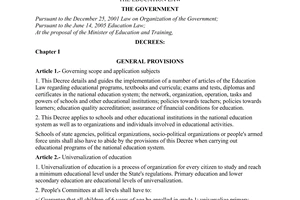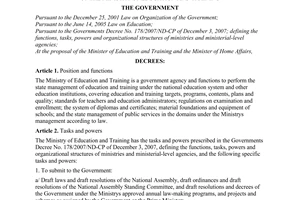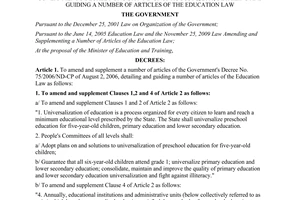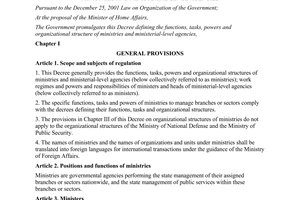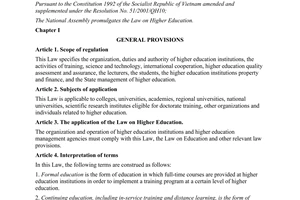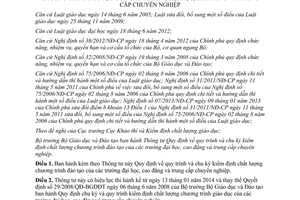Nội dung toàn văn Circular No. 38/2013/TT-BGDĐT quality assessment of training programs of universities colleges junior colleges
|
THE MINISTRY
OF EDUCATION AND TRAINING |
SOCIALIST
REPUBLIC OF VIETNAM |
|
No. 38/2013/TT-BGDĐT |
Hanoi, November 29, 2013 |
CIRCULAR
ON PROCESS AND FREQUENCY OF QUALITY ASSESSMENT OF TRAINING PROGRAMS OF UNIVERSITIES, COLLEGES AND JUNIOR COLLEGES
Pursuant to Law on Education dated June 14, 2005; Law on amendments to Law on Education dated November 25, 2009;
Pursuant to the Law on Higher Education dated June 18, 2012;
Pursuant to Government’s Decree No. 36/2012/NĐ-CP dated April 18, 2012 defining the functions, tasks, entitlements and organizational structure of Ministries and ministerial-level agencies;
Pursuant to Government's Decree No. 32/2008/NĐ-CP dated March 19th 2008, defining the functions, tasks, powers and organizational structure of the Ministry of Education and Training;
Pursuant to Government's Decree No. 75/2006/ND-CP dated August 02, 2006 providing guidance on the implementation of Law on Education; the Government's Decree No. 31/2011/NĐ-CP dated May 11, 2011 on the amendments to the Government's Decree No. 75/2006/NĐ-CP dated August 02, 2006 providing guidance on Law on Education; Decree No. 07/2013/NĐ-CP dated January 9, 2013 of the Government on amendments to Point b Clause 13 of Article 1 of Government's Decree No. 31/2011/NĐ-CP dated May 11, 2011 on the amendments to Government's Decree No. 75/2006/NĐ-CP dated August 2, 2006 providing guidance on the implementation of Law on Education;
At the request of Director of Department of Examination and education quality assessment;
The Minister of Education and Training issues a Circular on process and frequency of quality assessment of training programs of universities, colleges and junior colleges.
Article 1. The Regulation on process and frequency of quality assessment of training programs of universities, colleges and junior colleges is issued together with this Circular.
Article 2. This Circular takes effect from January 13, 2014 and replaces Decision No. 29/2008/QĐ-BGDĐT dated June 6, 2008 of the Minister of Education and Training on quality assessment of training programs of universities, colleges and junior colleges.
Article 3. Chief officers, Directors of Department of Examination and education quality assessment, Heads of agencies affiliated to the Ministry of Education and Training; Heads of agencies managing universities, institutes, colleges and junior colleges; the Presidents of the People’s Committees of central-affiliated cities and provinces; Directors of universities, institutes; Principals of universities, colleges and junior colleges; Directors of education quality assessment organizations (hereinafter referred to as EQAOs) shall take responsibility for the implementation of this Circular./.
|
|
PP. MINISTER
|
REGULATION
ON PROCESS AND FREQUENCY OF QUALITY ASSESSMENT OF TRAINING
PROGRAMS OF UNIVERSITIES, COLLEGES AND JUNIOR COLLEGES
(Issued together with Circular No. 38/2013/TT-BGDĐT dated November 29, 2013
of the Minister of Education and Training)
Chapter I
GENERAL PROVISIONS
Article 1. Scope and regulated entities
1. This Regulation promulgates process and frequency of quality assessment of training programs of universities, colleges and education programs of junior colleges (hereinafter referred to as training programs), including: internal assessment; external assessment and reassessment; verification of quality assessment result; approval of training programs; and implementation.
2. This Regulation is applicable to universities, institutions, colleges and junior colleges (hereinafter referred to as educational institutions) in the national education system; foreign-invested educational institutions operating within Vietnam’s territory; EQAOs; and relevant organizations or individuals.
Article 2. Interpretation of terms
For the purposes of this Regulation, the terms below shall be construed as follows:
1. “Education quality” means the achievement of targets of the training program set by an educational institution, the fulfillment of the requirements pertaining to education objectives prescribed in Law on Education, Law on amendments to Law on Education and Law on Higher Education, the satisfaction of the demand for human resources serving the local and national socio-economic development.
2. “Quality assessment” means the assessment and approval of the extent of the conformity of the training program with quality assessment standards prescribed in regulations of the Ministry of Education and Training.
3. “Internal assessment” means a process in which the educational institution examines and assesses itself based on the quality assessment standards provided by the Ministry of Education and Training in order to make a report on quality and effectiveness of its training activities, scientific researches, personnel, facilities, and other relevant issues of the purpose of adjusting the resources and the process of implementation in order to meet the education quality standards.
4. “External assessment” means the survey and assessment carried out by an EQAO based on the quality assessment standards provided by the Ministry of Education and Training in order to determine the extent of the conformity of the training program with the education quality standards.
5. “Quality assessment standard” issued by the Minister of Education and Training means the extent of the conformity of the training program with requirements for approval of education quality standards. Each standard comprises a number of criteria.
6. “Quality assessment criteria” means requirements and conditions that must be satisfied from a particular aspect of each standard.
7. “Information” means the materials used for supporting and illustrating the opinions in the internal assessment report. Information shall be collected from multiple sources to ensure reliability and accuracy when it is used during the assessment process.
8. “Evidence” means the information attach to criteria for determining the fulfillment of the criteria.
Article 3. Purposes of quality assessment
1. Ensuring and enhancing training program quality.
2. Approving the extent of achievement of the targets set over a certain period.
3. Serving as basis for educational institutions to explain the current quality of training programs to competent agencies and the society.
4. Serving as basis for students to select training programs and employers to recruit their staff.
Article 4. Process of quality assessment.
1. Internal assessment.
2. External assessment, reassessment (if any).
3. Verification of quality assessment result.
4. Approval of education quality standards.
Article 5. Frequency of quality assessment.
The quality assessment shall be carried out every 5 years.
Chapter II
INTERNAL ASSESSMENT
Article 6. The internal assessment process
1. Establishing the Internal assessment Panel (hereinafter referred to as Panel).
2. Making internal assessment plan.
3. Collecting, analyzing and processing information and evidence.
4. Preparing an internal assessment report.
5. Archive and use the internal assessment report.
6. Carrying out activities after completion of the internal assessment report.
Article 7. Establishment of the Panel.
1. The number of members of the Panel is an odd number, it has at least 9 members and each Panel is established for each training program by the Director or the Principal (hereinafter referred to as Principal).
2. Members of the Panel consist of:
a) A President of the Panel (hereinafter referred to as President) is the Principal of the educational institution;
b) Two Vice Presidents of the Panel (hereinafter referred to as Vice Presidents), in which one Vice President is the Vice Principal, and other Vice President is the Dean of faculty whose training program is assessed;
c) Other members: representative(s) of School Council (for public school) or Board of Directors (for private school), Council for Science and Training; Training Manager; representative(s) of Chiefs of departments, the Deans; representatives of reputable lecturers and teachers engaged in the training and scientific research activities relating to the assessed training program; and representative(s) of students of the training program;
d) Secretariat of internal assessment Panel, including officials of units in charge of quality assurance and other relevant officials related to the assessed training program;
dd) Full-time groups (including members of the Panel and the Secretariat) which are given particular assignments from the Panel. Each full-time group has 4 or 5 members that assesses from 1 or 2 criteria and one member of the Panel shall be in charge of each group. Each member of Secretariat may only participate in 1 or 2 full-time groups.
3. The Panel shall work on the principle of democratic centralism and reaches agreements through discussions.
Article 8. Functions and tasks of the Panel
1. The Panel shall help the Principal to carry out internal assessment and suggest measures for improvement of training program activities.
2. The Panel shall:
a) Disseminate policies on internal assessment; introduce the internal assessment process, research and exchange experience of internal assessment and request relevant units or individuals to cooperate in implementation;
b) Collect information and evidence, review activities and compare achievements with the targets set by the educational institutions; assess the extent of achievements, determine advantages and disadvantages of the training program; and propose plans for improvement of training program quality;
c) Compare the achievements with quality assessment standards prescribed in the Ministry of Education and Training and make the internal assessment report;
d) Announce the internal assessment report of internal educational institution;
dd) Organize and maintain the database of activities of the assessed training program;
e) Offer advices on measures for improvement of the assessed training program to the Principal or the Dean of faculty whose training program is assessed.
3. Members of the Panel shall:
a) The President shall take responsibility for operation of the Panel, give particular assignments to every member, which clarifies assignments equivalent to each criterion, start time and end time, person in charge and cooperated persons; convene and preside the meetings of the Panel; approve the internal assessment plan; direct the collection process of information and evidence, process, analyze and make an internal assessment report; and deal with issues arising during the internal assessment;
b) Other members of the Panel shall perform tasks assigned by the President and take responsibility for their assignments;
c) The Vice President, who is authorized by the President, shall manage the Panel and take responsibility for his/her authorized assignments.
4. The members are required to attend training courses in internal assessment regarding following contents: system of education quality assurance; process and frequency of quality assessment; guidelines for internal assessment; experience in domestic and foreign internal assessment; or following techniques: examination of documents or dossiers; interview, observation, group discussion, investigation and preparation of reports on internal assessment.
5. The Panel may request the Principal to hire consultant(s) to help the Panel in carrying out internal assessment. The consultant is required to obtain at least an MA degree, be proficient in the education quality assurance and assessment, internal assessment and necessary techniques to carry out the internal assessment.
Article 9. The internal assessment plan
1. Each educational institution shall make an internal assessment plan which is approved by the Principal – President.
2. The internal assessment plan must specify:
a) Purposes and extent of the internal assessment
b) The composition of the Panel;
c) The assignments of every member of the Panel;
d) Internal assessment instruments;
dd) Information and evidence that need collecting.
e) The estimate of the resources of facilities, finance and time for mobilizing resources during the internal assessment;
g) The schedule: specifying the necessary time for implementation and the schedule of specific activities during the internal assessment.
Article 10. Collection, analysis and processing of information and evidence
1. According to criteria mentioned in the quality assessment standards, the Panel shall give specific assignments to each member of the Panel to collect, analyze and process information and evidence before preparing the internal assessment report.
2. During the collection of information and evidence, their origins must be clarified. There are measures for protection and archives of information and evidence, including documentation related to the origins of the collected information and evidence. Information technology is encouraged to digitalize evidence, facilitate the archives and collation of evidence when necessary.
Article 11. Making the internal assessment report.
1. The internal assessment report must be brief, clear, accurate and must contain sufficient information about the activities of the training program, specify advantages and disadvantages, the difficulties and suggest the quality improvement solutions, the plan, the time limit, and the time of next internal assessment.
2. The internal assessment results shall be presented in succession according to the quality assessment standards. Each standard shall be presented in succession according to each criterion. Each criterion must contain 5 parts: description and analysis of training program activities related to the criterion, together with information and evidence; advantages and disadvantages; weaknesses; the action plan; the internal assessment of the extent of fulfillment of the criterion.
3. The draft internal assessment report must be announced in the internal educational institution for at least 2 weeks so that the administrative officers, lecturers, teachers, employees and students can read and comment.
4. The internal assessment report shall be completed by the Panel according to comments of the administrative officials, lecturers, teachers, employees and students. Principal – President shall approve the internal assessment report.
Article 12. Archives and use of the internal assessment report
1. The educational institution shall archive the approved internal assessment report together with relevant dossier during its preparation and completion.
2. The copies of internal assessment report shall be archived in libraries for reference. Regarding training programs need keeping confidential as prescribed by the State, the Principal shall impose regulations on use of internal assessment report according to confidential regime.
Article 13. Implementation of activities after completion of the internal assessment report
1. Carrying out the plans for improvement of quality specified in the internal assessment report.
2. Sending the internal assessment report to the governing body together with Official Dispatch on support for the improvement of the training program according to the action plans in the internal assessment report; and sending it to the Ministry of Education and Training (Department of Examination and education quality assessment).
3. Every year, the internal assessment report shall be updated with the conditions of the assessed training program and the educational institution (in the form of annual additional report) and archived in the library of the educational institution.
Chapter III
EXTERNAL ASSESSMENT AND REASSESSMENT
Article 14. Process and procedures for application for external assessment registration
1. An educational institution may apply for the external assessment carried out by an EQAO licensed from the Ministry of Education and Training after the approved internal assessment report has been announced in the internal educational institution for at least 30 days. Regarding training programs need keeping confidential as prescribed by the State, the educational institution shall send the internal assessment report to its governing body to apply for external assessment.
2. Every 5 years or at the request of the education authority, the educational institution must make an internal assessment report and apply for external assessment for approval of education quality standards.
Article 15. The contract for verification of internal assessment export and external assessment contract between the EQAO and the educational institution
1. At the request of the educational institution, the EQAO shall conclude a contract on verification of internal assessment report with the educational institution. The educational institution shall send the internal assessment report and relevant documents to the EQAO for verification.
2. Within 30 days, from the date on which the contract is concluded, the EQAO shall verify the internal assessment report and send the verification result to the educational institution in following cases:
a) If the internal assessment report does not meet requirements of format and content, the educational institution is required to complete the report;
b) If the internal assessment report meets the requirements, the external assessment may be carried out.
3. If the internal assessment report meets requirements, the EQAO and the educational institution shall conclude an external assessment contract.
4. The contract for verification of the internal assessment report and external assessment contract between the EQAO and the educational institution shall comply with regulations of law on economic contracts.
Article 16. Establishment of external assessment commission.
1. An external assessment commission, comprising 5 – 7 members, which is established under the decision of the Director of the EQAO, includes:
a) The chief commissioner being a Dean (or former Dean) of faculty or hold equivalent or higher positions. The chief must be knowledgeable of the program and its field, experienced in carrying out internal and external assessments.
The chief commissioner must manage the activities of the commission;
b) A secretary of the external assessment commission being a member of the EQAO and is experienced in carrying out external assessment. The secretary shall assist the chief commissioner to manage the activities of the commission;
c) A standing member of the external assessment commission being a member of the EQAO and is knowledgeable of the assessed training program. The standing member shall assist the chief commissioner to prepare and manage activities of external assessment in company with the secretary;
d) The remaining members of the external assessment commission include 2 – 4 experts from other educational institutions, education and training authorities, EQAOs, socio-professional organizations, or employers corresponding to the assessed training program.
2. All members of the external assessment commission are assessor of education quality assessment meeting requirements as prescribed in regulations of the Ministry of Education and Training. All members are responsible for implementation of assignments given by the chief commissioner.
3. Before establishing the external assessment commission, the EQAO must send the tentative list of the external assessment commission to the educational institution. The educational institution may request the EQAO to replace one or some members of the commission if there is evidence that such members have been in a conflict of interest with the educational institution, but may not suggest or propose any particular individual for participation in the external assessment commission.
The educational institution is considered to concur with the tentative list made by the EQAO if the educational institution does not give any opinion within 10 working days from the date on which the tentative list is received.
4. The external assessment shall be carried out after the EQAO and the educational institution have signed the external assessment contract, and the external assessment commission is established as prescribed in this Article.
Article 17. The external assessment steps
1. Examine the internal assessment documents:
The external assessment commission shall examine the internal assessment report and relevant documents; collect and process the information and evidence related to the quality assessment standards;
2. Carry out the preliminary survey at the educational institution;
3. Carry out the official survey at the educational institution.
4. Draft the external assessment report. The draft external assessment report must be passed by at least 2/3 of the commission members. The external assessment commission shall send the draft external assessment report to the educational institution for seeking opinions via the EQAO within 15 working days from the date on which the educational institution receives the draft report.
5. Complete the external assessment report:
a) Within 15 working days from the date on which the feedbacks from the educational institution are received, or from the deadline for the educational institution to give opinions, the external assessment commission shall send a notice about the accepted and rejected opinions via the EQAO. The reasons for rejecting opinions must be explained;
b) The external assessment commission shall complete the external assessment report, then send it together with the relevant documents (if any) to the Director of the EQAO. Then the EQAO shall officially send the external assessment report to the educational institution and request the contract liquidation.
c) The external assessment commission must keep the information related to the works and assessment result confidential until the EQAO officially sends the external assessment report to the educational institution.
Article 18. Reassessment of assessment result given by the external assessment commission
Within 10 working days from the day on which the external assessment report is received, the educational institution may request the EQAO to reassess the external assessment result upon the occurrence of the following issues:
a) The external assessment result fails to satisfy the requirements as prescribed in Clause 4 Article 23 of this Regulation against the expectations of the educational institution;
b) The educational institution does not concur with part or the whole assessment report made by the external assessment commission.
2. The commission that reassesses the assessment result given by the external assessment commission shall be established by the EQAO. The composition of this commission is similar to that of the external assessment commission. The members that participated in the external assessment commission at the educational institution may not join the reassessment commission.
3. The reassessment commission shall examine the documents of the external assessment commission, consult with the members of the external assessment commission; carry out the survey at the educational institution, consult with the heads of the educational institution, the Panel, and make a report on the reassessment of the assessment result given by the external assessment commission.
4. The reassessment result is considered the final conclusion of the EQAO about the assessed training program.
5. The educational institution must pay the cost of the reassessment of the assessment result given by the external assessment commission under the economic contract signed with the education quality assessment organization.
Article 19. Using the reassessment and external assessment results
The reassessment and external assessment results (if any) are the basis for the educational institution to implement the plan for improving and enhancing the education quality, and for the Education quality assessment council (hereinafter referred to as Council) of the EQAO to verify and consider approving the training program.
Article 20. Responsibility of the educational institution for the external assessment and reassessment (if any)
1. Prepare the documents and data related to the activities of the training program, and other conditions for the external assessment and reassessment (if any).
2. Appoint a leader of the educational institution and, a head of faculty (related to the assessed training program) and a contact to work with the external assessment commission and the reassessment commission (if any).
3. Cooperate and consult with the external assessment commission about the internal assessment report examination result, and the result of the survey carried out at the educational institution.
4. Within 15 working days from the date on which the draft external assessment report is received, the educational institution shall send a notification to the EQAO, specifying the agreement or disagreement on the draft external assessment report; if the external assessment report is disapproved, the reasons and evidence must be provided. If the educational institution does not send any feedback after this deadline, it is considered to concur with the draft external assessment report.
5. After the external assessment or reassessment result is concurred with, the educational institution shall send the EQAO a written request for the approval of education quality standards.
Chapter IV
VERIFICATION OF THE QUALITY ASSESSMENT RESULT
Article 21. The dossier on the verification of quality assessment result
1. The dossier on the verification of the education quality assessment result includes: the internal assessment report; the external assessment report; the written request made by the educational institution for the announcement of the external assessment result, for the of meeting education quality standards; the written feedbacks from the educational institution on the external assessment report, the notification made sent by the external assessment commission to the educational institution of the acceptance or rejection of opinions; the reassessment report (if any); the report on the summary of the results of the internal assessment, external assessment, and reassessment (if any), the summary of the issues that need discussing.
2. The secretary team shall assist the Council in making the plan for verifying the quality assessment result, preparing the verification dossier, and sending the verification dossier to the Council members at least 15 working days before the council meeting.
Article 22. The process of the verification of education quality assessment result
1. The Council meeting shall be convened to verify the quality assessment result:
The president of the Council or a delegated deputy president of the Council shall preside at the meeting to perform the following tasks:
a) Listen to the summary of the results of the internal assessment, external assessment, reassessment (if any), and the issues that need discussing;
b) Discuss the internal assessment result, the external assessment result, and the reassessment results (if any); the draft resolution of the Council on the verification of the quality assessment result;
c) Seeking recommendations of the Council to the educational institution about the rectification of the weaknesses, the improvement and enhancement of the education quality;
d) The Council shall ballot for the approval of the resolution on the verification of the quality assessment result.
2. The EQAO shall send the resolution on verification of the quality assessment result:
Within 10 working days from the date on which the verification result is available, the EQAO shall send the educational institution that applied for the education quality assessment the resolution on the verification of the quality assessment result, the recommendations of the Council to the educational institution about the rectification of the weaknesses, the improvement and enhancement of the education quality.
3. The educational institution shall receive the resolution on the verification of the quality assessment result and send feedbacks (if any):
If no course has been completed, the educational institution shall use the result of the verification of the quality assessment result for the improvement and enhancement of their quality.
If at least one course is completed, within 20 working days from the date on which the documents prescribed in Clause 2 of this Article are received, the educational institution must send written feedbacks to the EQAO on:
a) The agreement with the resolution and recommendations of the Council; requesting the EQAO to consider and certify that the educational institution meets the education quality standards, and issue the quality assessment certificate; or
b) The agreement with the resolution and recommendations of the Council; the plan made by the educational institution for overcoming the weakness, improving and enhancing the education quality for the purpose of applying for the education quality assessment in the near future;
c) The disagreement on part or the whole resolution and recommendations of the Council; calling for the reconsideration from the EQAO.
4. The EQAO shall carry out following tasks when receiving feedbacks from the educational institution:
a) In the cases prescribed in Point a Clause 3 of this Article, within 10 working days from the date on which the written feedback sent by the educational institution is received, the EQAO shall post the external assessment result, the resolution, and the recommendations of the Council on the website of the EQAO. After 30 days from the announcement date, if there is no complaint is made, the education quality assessment organization shall issue the quality assessment certificate to the educational institution; if complaints are made, the EQAO shall review the entire process and the dossier on the verification of the quality assessment result before deciding to issue or not to issue the quality assessment certificate to the educational institution.
b) In the cases prescribed in Point b Clause 3 of this Article, the EQAO must explain the resolution and recommendations of the Council at the request from the educational institution; provide consultancy, and assist the educational institution in improving and enhancing its education quality.
c) In the cases prescribed in Point v Clause 3 of this Article, the EQAO shall reconsider the resolution and recommendations of the Council in the next periodic meeting as prescribed in Clause 1 of this Article, and take the next steps prescribed in this Article.
Chapter V
APPROVAL OF QUALITY STANDARDS
Article 23. Conditions for the approval of quality standards
A training program shall be approved that it meets the quality standards when the following conditions are satisfied:
1. At least one course is completed.
2. An external assessment is carried out, and a written request sent to the EQAO for the approval of education quality standards is made. If the information of the training program must be kept confidential as prescribed by the State, the educational institution shall request that the external assessment result shall be sent to the governing body, and apply for the approval of education quality standards.
3. The external assessment result, the resolution, and the recommendations of the Council shall be posted on the website of the EQAO as prescribed in Clause 1 Article 27 of this Regulation. If the information of the training program must be kept confidential as prescribed by the State, the external assessment result, the resolution and recommendations of the Council shall be sent to the governing body at least 30 days before EQAO issues the approval for seeking assenting opinions.
4. The training program meets at least 80% of the criteria, and meets at least 50% criteria of a standard according to the education quality assessment result of the Council.
Article 24. Quality assessment certificate
1. According to the request made by the Council, the Director of the EQAO shall issue the quality assessment certificate to the training program that satisfies the conditions in Article 23 of this Regulation.
2. The quality assessment certificate is valid for 5 years from its date of issue, specifying the percentage of met criteria.
3. The quality assessment certificate is designed and printed by the EQAO after its design is registered with the Ministry of Education and Training.
Article 25. Responsibility of the educational institution issued with the quality assessment certificate
1. Post the quality assessment certificate on the website of the educational institution within 30 days after date on which the quality assessment certificate is issued (not applying for education institutions or training programs need keeping confidential as prescribed by the State).
2. Send reports to the Ministry of Education and Training and the governing body of the results of the quality assessment, the plan for improving and enhancing the education quality after being issued with the quality assessment certificate.
3. Sustain and develop the conditions for education quality assurance. Implement the recommendations made by the Council about the rectification of the weaknesses (if any) and the improvement of the education quality.
4. Sustain and improve the approved quality assessment result during the validity period of the quality assessment certificate. If the quality is not sustained consistently with the approved result, depending on the nature and seriousness of the violations, the educational institution shall be warned or have the quality assessment certificate revoked.
5. Make and send a mid-term report to the Ministry of Education and Training, the governing body, and the EQAO after 2.5 years from the date on which the quality assessment certificate is issued.
Article 26. Revocation of the quality assessment certificate
1. The quality assessment certificate shall be revoked if the educational institution commits violations in one of following cases:
a) Commit frauds during the implementation of quality assessment activities leading the training program is approved that meeting quality assessment standards.
b) The training program no longer satisfies the requirements of the quality assessment standards.
2. Procedures for revocation of the quality assessment certificate:
a) The Ministry of Education and Training shall send a written request for revocation of the quality assessment certificate enclosed with relevant documents to the Director of the EQAO;
b) The Director of the EQAO shall issue a decision on revocation of the quality assessment certificate within 15 working days from the date on which the written request sent by the Ministry of Education and Training is received.
3. The decision on revocation of the quality assessment certificate shall be posted on the websites of the EQAO, the Ministry of Education and Training and by means of mass media.
Article 27. Responsibility of the EQAO
1. Post the external assessment result, the resolution, and the recommendations of the Council on the website of EQAO at least 30 days before the education institution is issued with the quality assessment certificate (not applying for education institutions or training programs need keeping confidential as prescribed by the State).
2. Post the quality assessment certificate issued to the educational institution on the website of the EQAO within 5 working days after the date on which it is issued and maintain on the website for at least 5 years.
Chapter VI
IMPLEMENTATION
Article 28. The Department of Examination and education quality assessment shall:
1. Plan the education quality assessment according to the general plan of the education sector.
2. Instruct, supervise, inspect, and assess the implementation of the regulations on education quality assessment at the EQAOs, educational institutions, and relevant units.
3. Announce the list of EQAOs licensed to assess education quality on the website of the Ministry of Education and training and by means of mass media.
Article 29. The educational institutions shall:
1. Make plans for meeting the education quality standards in each period.
Follow the internal assessment process prescribed in Chapter II of this Regulation. After completing the internal assessment report, it is recommended to carry out cross-assessment (peer assessment) among the educational institutions in order to improve the quality of internal assessment reports.
Take responsibility for the external assessment, reassessment, and approval of education quality standards as prescribed in Article 20 and Article 25 of this Regulation.
Send reports to the governing bodies and the Ministry of Education and Training annually on the result of the plans for improving and enhancing the education quality; facilitate the inspection, supervision, and assessment from competent agencies.
Be entitled to make complaints against the acts, decisions, and conclusions made by the organizations and individuals engaged in education quality assessment when proof of the illegality of such acts, decisions, and conclusions are provided.
Article 30. The EQAOs shall:
1. Carry out the external assessment, and certify that the educational institutions meet the education quality standards as prescribed in Chapter III, IV, and V of this Regulation.
2. Send reports to the Ministry of Education and Training annually on the results of the education quality assessment.
3. Facilitate the inspection, supervision, and assessment from competent agencies.
Article 31. The budget
1. The budget of the educational institution for the quality assessment includes the sources funded by the State budget and the off-budget revenues. The receipts and spending must comply with the regulations issued by competent agencies and the regulations on internal spending of the educational institution.
2. Annually, the educational institutions shall make budget estimates for the quality assessment activities.
3. Educational institutions may receive lawful sponsorships from Vietnamese and foreign organizations and individuals to serve the activities related to the quality assessment and assurance./.
------------------------------------------------------------------------------------------------------
This translation is made by LawSoft and
for reference purposes only. Its copyright is owned by LawSoft
and protected under Clause 2, Article 14 of the Law on Intellectual Property.Your comments are always welcomed
